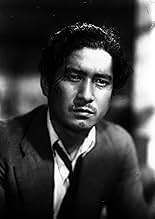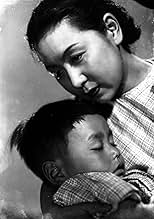AVALIAÇÃO DA IMDb
7,4/10
2 mil
SUA AVALIAÇÃO
Adicionar um enredo no seu idiomaA man returns from World War II to find his desperate wife had resorted to one night of prostitution to pay for their son's hospital bills.A man returns from World War II to find his desperate wife had resorted to one night of prostitution to pay for their son's hospital bills.A man returns from World War II to find his desperate wife had resorted to one night of prostitution to pay for their son's hospital bills.
- Prêmios
- 2 vitórias e 1 indicação no total
- Direção
- Roteiristas
- Elenco e equipe completos
- Produção, bilheteria e muito mais no IMDbPro
Avaliações em destaque
Kaze no Naka no Mendori deals with a very serious social problem of the time -- the return of those away at war. Frequently supposed dead and often delayed by years after the war's end, returning soldiers came back to families that had had to make all manner of compromises and sacrifices related to their absence. Often the returnees found that their wives had re-married, or worse...
This is one such story. Unusual for Ozu in that it depicts actual physical family violence. A bit shocking if you are used to his other films, in which disapproval is often expressed with raised eyebrows and silence.
A good film with fine performances.
This is one such story. Unusual for Ozu in that it depicts actual physical family violence. A bit shocking if you are used to his other films, in which disapproval is often expressed with raised eyebrows and silence.
A good film with fine performances.
In postwar Japan, a wife has to deal with the consequence of her decision when she needed her son's hospital charges during her husband's absence. The theme, women's harsh reality at the time, is exceptionally serious for Ozu. It makes Hen in the Wind uniquely and intensely emotional, combined with Ozu's style, such as off-screen actions, implicative montages, and singsong dialogues.
It is not one of Yasujiro Ozu's best films. Both just after the war he made Record of a Tenement Gentleman (1947) and the Late Spring (1949) but this one comes between these two. The others are fine but not this one, it is not terrible but it is that, we know what is going to happen. The husband is away in the war and she is having to sell her clothes so she can feed her toddler. It gets more sad for her when he is unwell and naturally the hospital bills have to be paid. Even she knows what she will have to do and her friend mentions what she can do. We don't see her prostitute herself but we know and of course her husband is soon back home lazing around and has to find out how she had got the money. Raping her and throwing her down the stairs are because he is rather upset and that he felt unmanly. We can't really comprehend this couple, especially because of the war, but certainly in Japan we can just about understand how it is for them.
10kerpan
Ozu's late film are far more varied than "common wisdom" would have it -- but, by any measure, "Hen in the Wind" (from 1948) is especially "atypical". This is the only Ozu film I've seen (out of 21 or 20) that has a tangible (and even raw) physicality -- it is more like proto-Imamura than "standard" Ozu (no -- Imamura was not yet working as Ozu's assistant -- that only began around 1951). Characters crawl, slither, and slide about. Sometimes, visually oversized bare feet stick into the foreground. Kinuyo Tanaka loses all self possession at the climax, and practically keens her dialog -- at a much higher pitch than I've ever heard her use in any other film.
This is an interesting story that deals with the collateral damage caused by WW2 (and the ensuing occupation) -- as it affected the lives of one young married couple. It was a flop with the audience, I guess -- so it became a path not traveled further. Artistically, it may not be completely successful, but it was a worthy effort.
This is an interesting story that deals with the collateral damage caused by WW2 (and the ensuing occupation) -- as it affected the lives of one young married couple. It was a flop with the audience, I guess -- so it became a path not traveled further. Artistically, it may not be completely successful, but it was a worthy effort.
A sensitive and powerful examination of the moral compromises made during World War II and the toll they take on families. Kinuyo Tanaka gives another of her sensitive and compelling performances as a woman forced into prostitution to care for her sick child, and is unable to keep her secret when her husband returns from the front. Ozu takes on the topic of prostitution while steering well clear of its potential for sordidness (something I find both a virtue and a limitation... in some ways it's *too* tactful). The scenes between the two exceptional leads contribute to a film blessed with some of the most uncomortable scenes Ozu has filmed, delving deep into raw unresolved emotions of guilt, honor and devotion.
Você sabia?
- CuriosidadesFrench visa # 159347.
- Citações
Tokiko Amamiya: I'm willing to give mu soul if it means raising my son.
- ConexõesReferenced in Eu Vivi, Mas... Uma Biografia De Yasujiro Ozu (1983)
- Trilhas sonorasYume awaki Tôkyô
Music by Yûji Koseki
Principais escolhas
Faça login para avaliar e ver a lista de recomendações personalizadas
- How long is A Hen in the Wind?Fornecido pela Alexa
Detalhes
- Tempo de duração1 hora 24 minutos
- Cor
- Mixagem de som
- Proporção
- 1.37 : 1
Contribua para esta página
Sugerir uma alteração ou adicionar conteúdo ausente

Principal brecha
By what name was Uma Galinha no Vento (1948) officially released in Canada in English?
Responda
























